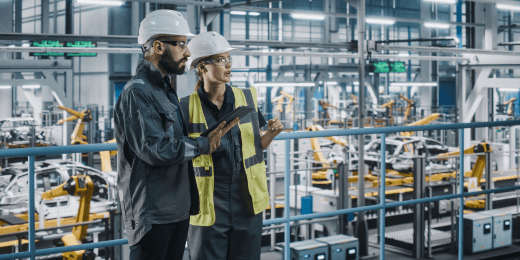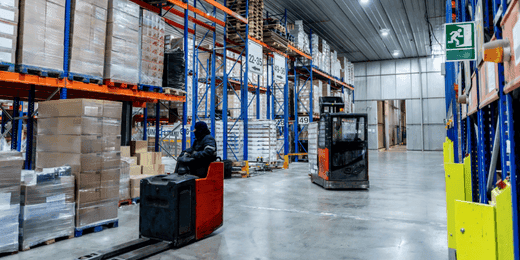Understanding Process Manufacturing
Learn how process manufacturing helps industries streamline production, ensure product quality, and meet safety standards.

Published 26 Mar 2025
Article by
5 min read
What is Process Manufacturing?
Process manufacturing is a method of production that involves creating products by combining raw materials or components using a series of steps or processes. These processes are often continuous and involve chemical reactions, physical transformations, or a combination of both. Industries such as food and beverage, pharmaceuticals, chemicals, and plastics commonly use process manufacturing to create their products. Additionally, this method requires specific process equipment, recipes, and quality control measures to ensure consistency and quality in the final product.
Difference Between Discrete and Continuous Manufacturing
The main difference between discrete and continuous manufacturing as processes lies in the production process. Discrete manufacturing involves producing distinct, separate items that are easily countable and identifiable. This can include products such as cars, computers, or furniture. Each item is assembled individually, and production is usually done in batches.
Conversely, continuous manufacturing involves constantly producing goods with no interruptions in the production process. This can include products like chemicals, oil, or paper.
Both types of manufacturing have their advantages and challenges, depending on the industry and product being produced.
Streamline Your Manufacturing Operations
Harness frontline insights, digital workflows, and seamless communication to boost efficiency and productivity across all manufacturing sites.
Benefits
Process manufacturing offers numerous advantages that enhance production and efficiency. Some benefits of this approach include the following:
Cost-effective
By continuously producing products, process manufacturing minimizes downtime and idle equipment costs, saving on expenses. Automated systems also reduce labor costs, as fewer workers are required to operate the machinery. This lower production cost makes companies more competitive and increases their profit margins.
Enhanced Quality Control
Process manufacturing involves strict quality control measures throughout the entire production process. These measures ensure consistency in the final product, minimizing defects and errors that could lead to recalls or waste. The use of precise recipes and detailed record-keeping enables manufacturers to trace any issues back to a specific batch or process step, making identifying and correcting any issues easier.
Flexibility
Process manufacturing is highly adaptable, allowing manufacturers to produce a wide range of products. Using different recipes and raw materials, companies can easily switch between products without significant downtime. By staying flexible, businesses can more easily keep up with changing market demands, remaining competitive.
Scalability
With the increasing demand for products, scalability is crucial for manufacturers. Process manufacturing offers scalability by allowing producers to increase or decrease production output easily. This way, companies can adjust their production levels as the market fluctuates, reducing the risk of overproduction or underproduction.
Improved Safety
Process manufacturing is often highly automated, reducing the risk of human error and accidents. Automated systems also handle potentially hazardous materials, improving workplace safety for employees. Additionally, with strict quality control measures, process manufacturing ensures that products meet safety and regulatory standards.
Simple Product Base
Process manufacturing creates products of consistent quality and composition using specific recipes. This simplicity in the product base makes it easier to control inventory and manage supply chain logistics. Manufacturers can also replicate successful products repeatedly, simplifying production planning and forecasting.
Types of Manufacturing Processes
There are different manufacturing processes used in process manufacturing. They are:
Make to Stock (MTS)
MTS is a traditional manufacturing operations technique where products are produced in anticipation of potential demand and stored in inventory. This strategy allows manufacturers to estimate production volumes based on prior sales data and market research. With MTS, customers receive products instantly when desired, making it a historically preferred manufacturing approach.
Make to Order (MTO)
MTO is a type of production where products are only produced after a customer orders them. This strategy reduces the risk of overproduction and ensures that all goods produced have a specific customer demand, minimizing inventory costs. However, MTO manufacturing can lead to longer lead times since production only begins once an order is received.
Make to Assemble (MTA)
MTA is a hybrid manufacturing process that combines elements of MTS and MTO. This approach involves producing components that anticipate potential demand and are assembled into finished products after receiving customer orders. With this process, manufacturers can reduce lead times by pre-producing the components, all while still having the flexibility to customize the finished product.
Explore SafetyCulture Monitoring Solution
Utilize advanced sensor technology to monitor assets, automate vital alerts, implement actions, and report urgent issues.
Process Manufacturing Examples
Some examples of industries that use process manufacturing include the following:
Pharmaceutical Industry
The pharmaceutical industry relies heavily on process manufacturing to produce various drugs and medications. This industry is highly regulated, which requires strict quality control measures to be in place, making process manufacturing an ideal production method.
Food and Beverage Industry
Process manufacturing is also prevalent in the food and beverage industry. Products such as soft drinks, dairy products, and packaged foods are typically produced using this approach. Process manufacturing enables consistent product quality and safety through precise ingredient measurements and strict hygiene standards.
Chemical Industry
The chemical industry uses process manufacturing to produce various products, such as cleaning agents, fuels, plastics, etc. This type of production ensures accurate measurement and mixing of chemicals, ensuringproduct consistency and safety. The complex production processes in this industry also benefit from automation, as it helps improve overall efficiency, reducing the risk of human error.
Better Process Manufacturing Using SafetyCulture
Why use SafetyCulture?
SafetyCulture is a mobile-first operations platform adopted across industries such as manufacturing, mining, construction, retail, and hospitality. It’s designed to equip leaders and working teams with the knowledge and tools to do their best work—to the safest and highest standard.
Streamline processes, eliminate bottlenecks, enhance resource utilization, and build an agile and scalable infrastructure with SafetyCulture. Strive for operational excellence to boost competitive advantage, foster sustainable growth, and deliver long-term value.
✓ Save time and reduce costs ✓ Stay on top of risks and incidents ✓ Boost productivity and efficiency ✓ Enhance communication and collaboration ✓ Discover improvement opportunities ✓ Make data-driven business decisions
Related articles
Manufacturing Procedure
Operations

The Blueprint for Refrigeration Optimization
Learn how refrigeration optimization improves energy efficiency, reduces operating costs, and extends equipment lifespan across industries.
Operations
Business Processes

Mastering Workflow Orchestration for Operational Excellence
Learn everything about workflow orchestration, its benefits, common tools, and best practices for efficient enterprise process management.
Operations
Business Processes

Implementing Value Management for Better Business Outcomes
Explore value management, its principles, benefits, and helpful strategies to drive peak performance and cost-efficiency.